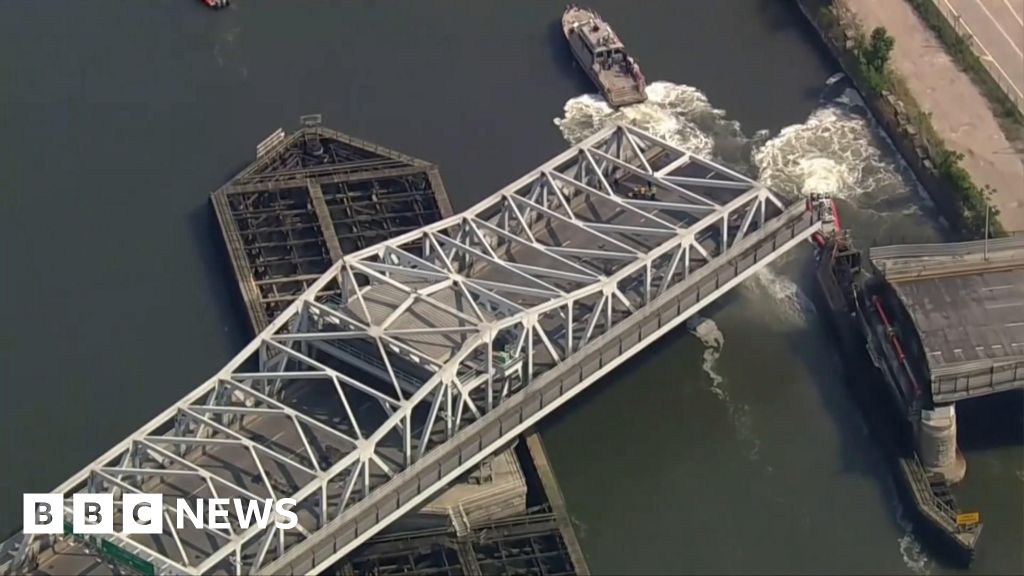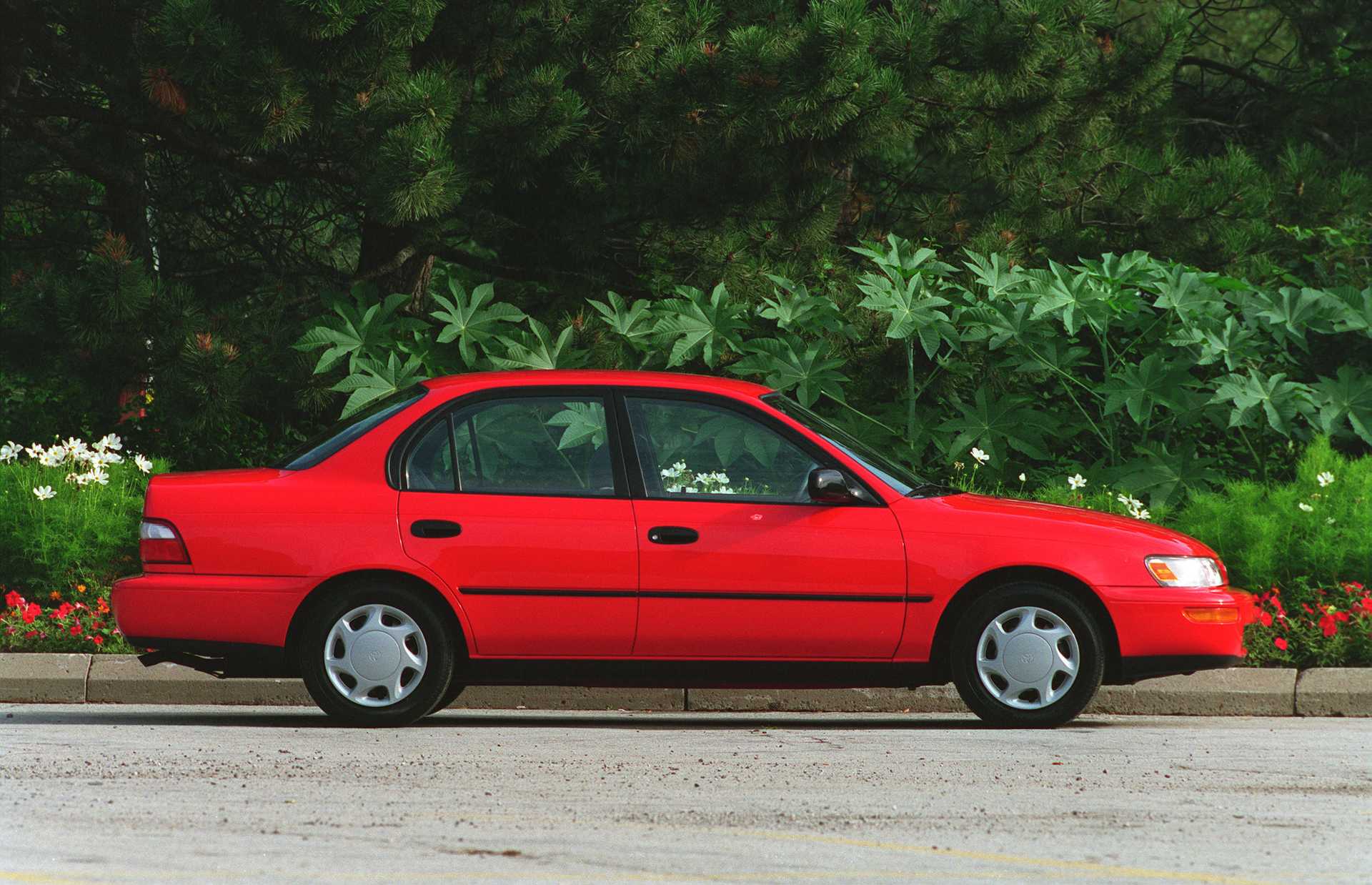- cross-posted to:
- klimawandel@feddit.org
- cross-posted to:
- klimawandel@feddit.org
Third Avenue Bridge, which connects New York’s the Bronx to Manhattan, got stuck in an open position due to the high heat on Monday.
FDNY officers arrived in boats and fired water at the structure to try and cool down the metal, which expanded after high temperatures in the city, officials say.
The incident caused major traffic delays during one of the hottest days of the year in New York but reopened on the same day.
Okay… so… Republicans… I know you’re not big on science, but the Earth is not supposed to get so hot that metal expands to the point that we can’t move a metal bridge that’s reliably moved for a very long time.
deleted by creator
Usually I don’t need the /s to figure it out, but I did here!
You’re not alone.
Damned DEI bridges!
Infrastructure in NY is crap, but unrelated to this particular bridge problem.
It probably just needs another coat of paint.
That will be 1 billion bill for mckinsey consulting
5 million to union labour and 1 million for paint!
Why do you unions destroy America?
The bridge is warming up from too much wokeness eminating from the city!!!
Lol you should never follow up poor NY leadership with /s regardless of the party in power. Them not thinking they needed to include extended magazines in the SAFE Act because they thought magazines were disposable and would phase themselves out as long as they couldn’t be sold, and the entire fucking legalization of recreational marijuana shit show should be more than enough to remove the /s and that’s all without including anything that shit for brains cuomo did lol
the Earth is not supposed to
I don’t think we get to say what the earth is “supposed to” do.
For most of the earths existence it wouldn’t be possible for humans to exist. I don’t think it really gives a shit about a bridge we built.
You’re denying humans are causing climate change, aren’t you?
Changing topics. Good strategy.
Not even a little bit. I fully believe humans are causing climate change. It is going to make life as we know it on this planet completely different in the very near future.
I still think the planet itself doesn’t give a shit, and claiming there is a way it is “supposed to be” is pretty narrow minded.
Changing topics? The comment you replied to was literally about humans causing climate change.
So no, I wasn’t changing topics.
But you’re right, the planet is a big ball of iron and doesn’t give a shit. I was using what we call on this iron ball “figurative language” in order to explain why this is bad for our species.
Here is a resource to help you with this concept we Earth humans came up with thousands of years ago: https://www.masterclass.com/articles/writing-101-what-is-figurative-language-learn-about-10-types-of-figurative-language-with-examples
I think we agree on most of the points here, and now we’re just getting defensive about tone, and details.
I was just trying to point out that nothing has a way it is supposed to be. There is what things are, and there is what we want. Yes you can use many of the features of our language to convince people of your opinion.
I myself don’t like the idea of personifying the planet then imbuing it with opinions so I made the comment I did.
You must be a joy on Earth Day.
I am. 🙂
Is official. 2024 is using early 2000 blockbusters movie’s plots now. What a bunch of lazy screenwriters.
Here, you now have free long distance on this phone. Forever.
deleted by creator
Not the same damage, nor the same cause.
Not the same Sun?
Not the same solar heat ray focused entirely on one bridge.
Tomatoes/ nuclear radioactive mutated Tomatos 🍅
… Pretty much the same 🤷♂️
Attack of the killer tomatos isn’t the same as a good Beefsteak
/j
Point taken 👍
We had a similar issue with an older bridge here in Gothenburg, Sweden. The fix was to install water sprinklers during the summer to keep the bridge from expanding too much.
What if we cooled it with the blood of climate change deniers?
Dumb question, but why is the water cooler than the bridge? Because it was underground? Or does the evaporation help because it’s endothermic?
It’s a good question. Steel is very good at absorbing and retaining heat. Water on the other hand isn’t. Metals in general have way better thermal conductivity than water.
Exposed to the sun at the same time, a piece of metal will warm up a few times faster than the water. I believe steels can be somewhere around 8-10 times less energy required than to heat a similar mass of water.
The water could even start out slightly warmer than the bridge. Evaporative cooling would also work here since there is plenty of ventilation around the bridge. But that can slow down based upon humidity level.
Because metals have way better thermal conductivity, they aren’t good at retaining heat.
Heating equal masses of steel and water the same amount takes exactly the same energy, it just might take longer for the insulator vs. the conductor.
Specific heat of liquid water is around 4. Steel is like .45-.50 or around there. So it would take 450-500 joules to increase 1kg of steel 1C. Would take around 4k joules to increase 1kg of water by 1C.
Isn’t your wording on the previous post a bit wrong? Metal isn’t good at retaining heat, quite the opposite but it is a lot easier to heat it up in terms on temperature causing the issue in question. The issue isn’t that it is retaining heat but the temperature raising quicker as environment gets hotter.
I should have added “compared to the air around it” because that’s what I was thinking in my head.
I entirely forgot about specific heat. I am an idiot.
Both. Even the river water below the surface will be cooler than steel that’s been sitting in the sun. And putting that cool water on the bridge absorbs some of the heat and is removed in evaporation, just like sweating.
Water also needs a substantial amount of energy to evaporate, hence it will sip some heat from the environment around it when it evaporates. Combined with the good thermal conductivity of steel, the bridge cools off.
You get a similar effect when walking out of a hot shower. The hot water evaporates and cools you down.
I’m learning so much from this post.
Touch the roof of a car in the sun. Shit’s hot.
Probably because the metal absorbed heat from sunlight and heated up considerably, but the water was room temp only.
Probably both. Definitely evaporation will remove the most heat if both substances are at the same temperature initially.
Simplified: Energy is stored as heat in matter (the jostling of atoms and molecules) and there are many more water molecules under the bridge than there are molecules/atoms in the bridge. So both the water and the metal heat up during the day and cool down at night, but since there is much more water, the water has a much more stable temperature. In short: Larger volumes of atoms have larger heat capacities.
If the water under the bridge was stagnant and a shallow puddle, then it’s temperature would vary much more throughout the day as well, but it would still warm up less than metal or soil, since a body of water loses some of it’s heat through evaporation.
This is also why coastal climate is a thing: the huge mass of water in the ocean makes it so that coastal areas are warmer in the winter and cooler in the summer.
Ah, we’ve reached the collapsing infrastructure stage of climate change. Oh good.
Are you kidding? This is infrastructure expansion!
In Switzerland a major highway got damaged by floods and they expect some valleys in the Alps to become uninhabitable. We are ahead!
At least it’s effecting people responsible for climate change and not small tribes on far out islands like has been up to this point.
Billionaires don’t use bridges. They won’t notice till they can’t fly.
They are definitely not driving between East Harlem and the South Bronx. No rich people live in either of those places and they don’t connect any expensive areas.
Hurricane Sandy was the climate issue that really affected Downtown Manhattan. It’s a big part of the reasons why wealthy people actually care about climate change.
How much do they care? Also, we’re comparing small, island nations that are losing landmass every year to “First World Nations”. Poor Americans still qualify as rich in this case. Try getting an American to do more about climate change then saying mean things about billionaires online and you’ll see what I mean. So much of it is about their identity and not about action.
People from those “small island nations” are a substantial part of the population of Upper Manhattan and the Bronx. They send a lot of money back home. They are the same people that you consider “poor”.
The island nation of Tuvalu, which is currently having to make plans because of rising sea levels has a per capita gdp of 5,221.53 USD. Manhatten has a per captia gdp of 474,462.94 USD. This is by 2022 numbers, but I doubt they changed much.
As shitty as moving it, it’s much easier for Manhattanites to migrate to higher ground then it is for the people of Tuvalu. Both in terms of logistics and available resources. I am so, so sick of hearing from “bleeding heart liberals” who only seem to roleplay progressivism, but can never muster any action because the popcorn and circus is too good.
Day traders do.
Yaaaaaasaay… 🎉🎉🎉
Not a bridge expert, or really any kind of expert, really. But railroad rails are laid with a little gap to account for thermal expansion of the rail on hot days. If the expansion is more than designed for, you get buckling like this. This bridge was probably also designed to account for thermal expansion to a certain degree. It seems like more and more of our infrastructure is starting to fail, encountering heat levels it was never expected to encounter. I wonder if failures like this and worse are going to become a common headline
This bridge was probably also designed to account for thermal expansion to a certain degree. It seems like more and more of our infrastructure is starting to fail, encountering heat levels it was never expected to encounter. I wonder if failures like this and worse are going to become a common headline
Bridge engineer here (not much experience, so I wouldn’t consider myself an expert, but I have more knowledge about it than the general public).
Your suspicions are correct, bridges are designed for thermal expansion. More of our infrastructure is starting to fail, and part of that is because it’s experiencing climate it was never designed for (heat, sea level rise, more drastic storm surges, etc). I would fully expect this to be a more common headline. At least for several more years, anyway. If the federal money from the infrastructure bill the US passed a few years ago runs out or is not allocated to the right structures, then this will only get more common. I don’t expect the Trump administration to champion an extension of these funds if they do run out. It was passed under Biden, after all.
As for this bridge in particular, this is a moveable steel bridge. The fact that it’s moveable means it is particularly sensitive to expansion (as well as salinity which causes rusting). Too much expansion, and the steel will get stuck in one position. In a typical steel bridge, if the thermal expansion exceeds what it was designed for, you end up getting higher stress levels in the steel as it pushes harder against the abutments. Usually this is alright in the short term, since we design these to withstand much higher stresses than it will ever likely experience. Repeated cycles of this, however, will cause fatigue failure (think of a paperclip or metal spoon snapping after you bend it back and forth a bunch).
Anyways, there you have it. I rambled for too long about this lol.
I rambled for too long about this lol.
The fuck you did! Making the world a little less dumb, one ramble at a time, is a good thing. We don’t all need to be specialists in everything, but a brief summary like this contributes to our general knowledge and is a net positive.
Thanks for this additional info; your comment was interesting
No problem! I just like bridges and sometimes can’t help myself lol.
Do you have a favourite bridge?
Edit: I don’t know many bridges, but I quite like the Millennium Bridge in Gateshead. (https://en.m.wikipedia.org/wiki/Gateshead_Millennium_Bridge) My dad took me and my siblings there when it opened. It was a big deal for the area and I was young enough to not understand why, so I looked at it real hard to try to understand why everyone was so hyped. I concluded that it was a pretty good bridge.
Hank?
According to Practical Engineering, tracks are no longer given a gap. The gap causes premature wear and excess noise. Instead, they lay the track under tension, and weld the joins between sections.
There is still a limit on how much heat they can handle before buckling, of course. I just thought that was a neat innovation.
That sounds crazy. How do they do it? Just lay the rails on a hot day?
Basically, yes, though I think they have special hydraulic pullers, too. I forget the exact name. They have to take special measures if the day is too cold.
Rail is laid at a “neutral temperature” calculated from the min and max temperatures of an area. They want the rail to not pull apart in the cold or buckle in the heat. If average temperatures go up that calculated neutral temperature goes up so rail laid at a lower neutral temperature are more likely to buckle.
There are so many industries where building or manufacturing standards will not withstand environmental changes.
We’ve got something north of a trillion dollars in deferred infrastructure maintenance. You see the edges of the problem in the whole Flint water crisis, when a cheapo state appointed city planner overruled the local government to pump untreated river water through aging leaded pipes. Or the Minnesota bridge collapse.
But this kind of underfunded domestic investment is everywhere. We’ve leeched vast stocks of wealth from our urban core and thrown it into our war machine abroad, and now our nation is crumbling under our feet.
Climate change simply accelerates the speed of the rot.
It’s obviously Joe Biden’s fault. Bridgocide Joe.
You joke, but Kathy Hocul and Andrew Cuomo have been underfunding transit for over a decade.
This is absolutely a problem of “business friendly” Democrats diverting funding for basic public services to their corporate buddies at Amazon, across Wall Street, in the NYPD, and in the publicly subsidized sports arena racket.
I think that comment was meant satirical.
And yet, as shown with the reply, satire can help discussion along when mindful are wistful as well.
Thanks Obama
There’s a “spinning” draw bridge that goes onto Gwynn’s Island in Virginia that they have to do this to. Not sure how new of a phenomenon that is but it’s been at least a few years now.
Not the same traffic backup as NYC, but crazy still.
Did they try puttin some ice on it? Jeez, talk about woke propaganda -_-

















